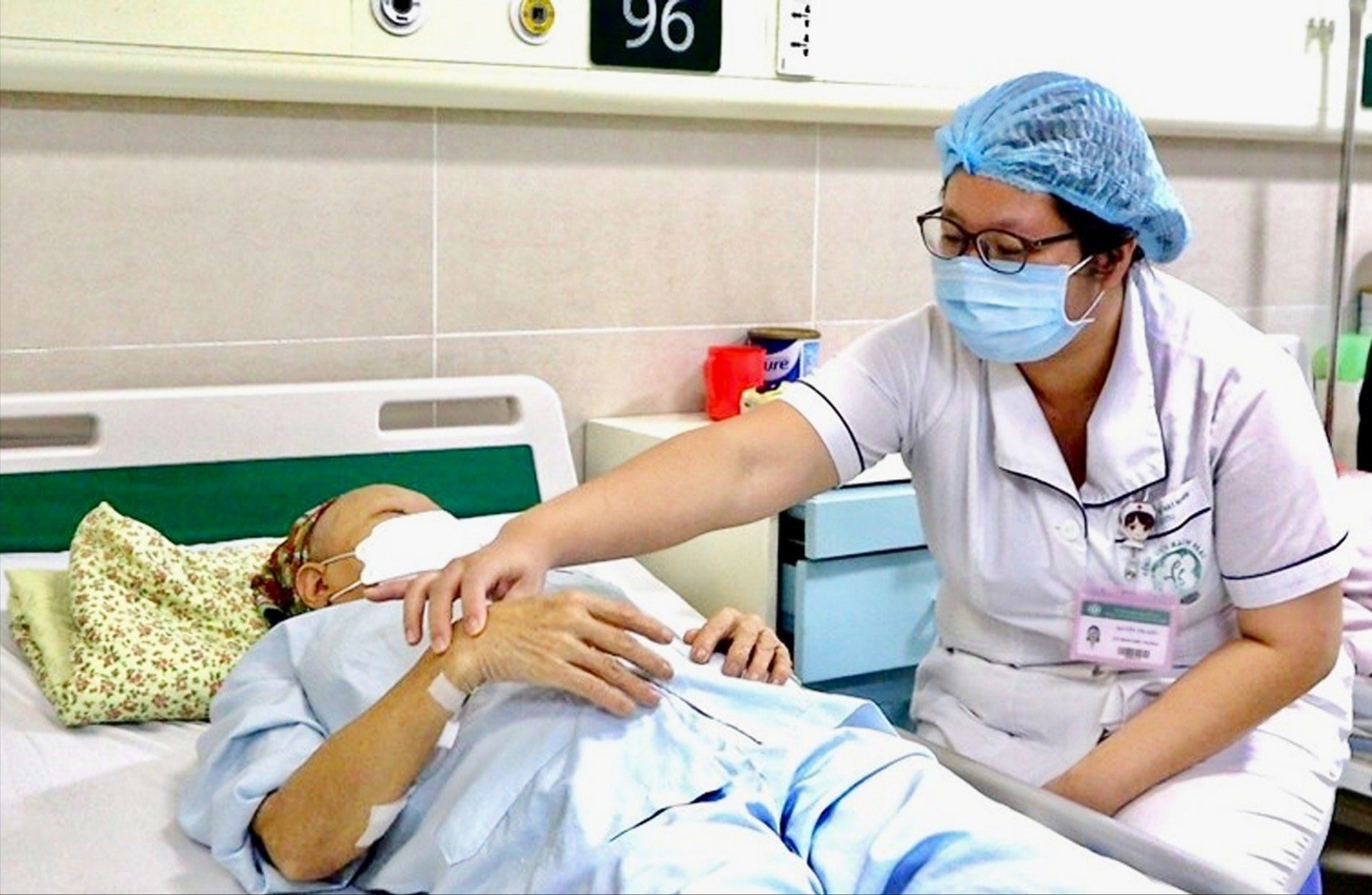In addition to environmental factors, diet, and lifestyle habits, medical experts are increasingly interested in genetic counseling - which can be the "golden key" in cancer prevention and treatment.
Caring for cancer patients at Bach Mai Hospital.
The link between cancer and genetics
According to Associate Professor, Dr. Pham Cam Phuong, Director of the Center for Nuclear Medicine and Oncology, Bach Mai Hospital, about 5 - 15% of cancer cases are related to genetic factors. This means that many people are born with congenital gene mutations. Although these mutations do not cause disease immediately, they can be activated and lead to cancer when encountering favorable factors from the environment, lifestyle or changes inside the body.
Some types of cancer have been noted to have a close relationship with genetic factors, including breast, ovarian, colorectal, prostate and pancreatic cancer. Among them, BRCA1 and BRCA2 gene mutations are typical cases. People with mutations in these two genes have a 5-7 times higher risk of developing breast cancer than normal people. In addition, they also face a higher risk of disease recurrence and a shorter disease-free survival time. Therefore, Associate Professor, Dr. Pham Cam Phuong believes that early detection of people at genetic risk not only helps them receive close medical monitoring but also facilitates proactive prevention such as regular screening, lifestyle changes or medical intervention.
In recent years, the rapid development of molecular biology technology, especially next-generation sequencing (NGS), has changed the approach to cancer diagnosis and treatment. In the past, doctors relied mainly on imaging, biopsy or biochemical tests, but today, an NGS test can simultaneously analyze dozens to hundreds of cancer-related genes in a short time with high accuracy.
In Vietnam, many central hospitals and large cancer treatment facilities have integrated genetic testing into the treatment process. For example, for breast cancer patients, BRCA gene testing not only helps determine risk but also helps choose a more appropriate treatment regimen, especially in the indication of using targeted drugs. For metastatic colorectal cancer, testing genes such as RAS, BRAF and MSI helps doctors decide whether to use immunotherapy or targeted drugs. This optimizes treatment effectiveness, reduces side effects and saves significant costs for patients.
However, genetic testing is not everything. The results are only truly valuable when accompanied by genetic counseling, helping patients and their families understand the meaning of the results, the level of risk, the possibility of inheritance in relatives and appropriate response measures. Dr. Doan Thi Kim Phuong, Hanoi Medical University Hospital, emphasized that genetic counseling is not simply explaining test results but also helping patients understand the risks and appropriate treatment directions. Patients are given specific explanations about the purpose and meaning of the test; the risk of disease and inheritance to children; treatment and prevention options that can be considered.
Genetic counseling is not only for patients, but also especially necessary for family members - those who may carry the same gene mutation but have not yet shown clinical symptoms. Early detection and close monitoring of this group of subjects helps to implement preventive measures such as periodic screening with imaging and testing; changes in diet and lifestyle; and preventive surgery (removal of the breast or ovaries for BRCA gene carriers).
Open up new approaches
According to statistics from the Global Cancer Registry (Globocan), each year Vietnam records nearly 24,500 new cases of breast cancer with more than 10,000 deaths; about 1,500 new cases of ovarian cancer, with over 1,000 deaths; nearly 6,000 cases of prostate cancer, with 2,800 deaths; about 1,250 cases of pancreatic cancer, in which the mortality rate is almost equal to the number of cases. It is worth discussing that the rate of BRCA1 and BRCA2 mutations in these disease groups is recorded at a high level, specifically about 15% in ovarian cancer, 10 - 17% in triple-negative breast cancer, 5 - 10% in prostate cancer and 5 - 7% in pancreatic cancer.
These figures show that genetic testing and genetic counseling need to be expanded and prioritized in the national strategy for cancer prevention and control. However, the biggest barrier today is the shortage of human resources specializing in genetic counseling.
According to Associate Professor, Dr. Ngo Quoc Dat, Rector of Ho Chi Minh City University of Medicine and Pharmacy, Vietnam currently has very few properly trained genetic counselors. To overcome this situation, the school is implementing postgraduate training programs and short-term courses in collaboration with AstraZeneca Vietnam, to quickly strengthen the team of genetic counselors.
In addition, health experts believe that there should be financial support policies from health insurance or public health programs so that everyone can access genetic testing, especially those with a family history of cancer. Proactively understanding genes to control health Genetic medicine is opening up a new approach - where people can proactively control their own health based on understanding their personal genome. From there, not only can we treat diseases more accurately, but we can also prevent diseases more effectively, reduce medical burdens and improve quality of life.
hanoimoi.vn
Source: https://baolaocai.vn/tu-van-di-truyen-chia-khoa-vang-trong-cuoc-chien-chong-ung-thu-post648618.html




































































































Comment (0)